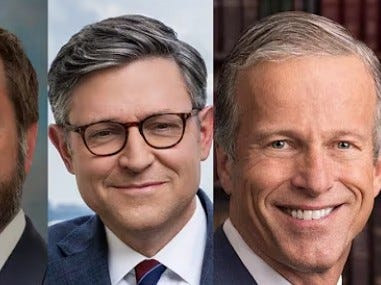Experts Say Congressional Inaction is Enabling Democratic Backsliding
The U.S. Congress has all but laid down in the face of potential authoritarian threats from the Trump administration and has played the part of a silent actor according to experts.
The Daily is journalism for the people. Please support our work by becoming a subscriber.
The silent actor. The passive enabler. The fearful smallness of our lawmakers in the fact of the authoritarian threat of the Trump regime.
That is today’s topic in how to fight authoritarianism.
Congress has been unusually passive in confronting potential authoritarian threats, according to a Columbia SIPA panel “IGP Rapid Response: Governmental Attacks on Civil Society—Lessons for the US from Around the Globe.”
Professor Vicky Murillo, who studies democratic erosion and institutional weakness and is the author of "The Politics of Institutional Weakness in Latin America,” made particular observations relatig to the unprecedented silence of Congress.
“Congress has been a silent player. That's also quite unusual. In general, the opposition parties in Congress play a role here. There's not much time that has passed. We don't know. Maybe when we get to the budget, maybe when we get to policy discussion, particularly tax cuts that have been promised to everyone, we will see some Congress action. But so far, Congress has been a silent actor. That's also unusual,” Murillo said.
Congress, which is currently led by Republicans in both chambers, has been a “silent actor” that is not actively challenging executive overreach. There is an unusual lack of institutional resistance by Congress, she noted, and I would add that even when the Trump regime steps on the Constitutionally-mandated power and authority of Congress, these folks are too often silent actors, and thus they cannot take protection in weak and dishonest claims of Trump’s non-existent “mandate,” as it doesn’t matter even if Trump had a mandate. A mandate doesn’t erase the checks and balances inherent in the job of U.S. Congressional lawmakers.
They discussed that Congress is enabling the authoritarian takeover by, for example, presenting no significant opposition to executive actions, limited pushback against the erosion of democratic norms, and potential complicity through inaction.
They (note that “they” refers to the overall discussion, not each panelist specifically as they all brought different points of view, but for the sake of imparting their wisdom to you in an easily digested manner, I’m combining their thoughts under the umbrella of “the panel”) pointed out that Congress is not fulfilling expected roles in terms of checking executive power, protecting institutional independence, defending democratic norms, or providing legislative oversight.
The panel brought a global perspective to the challenge of fighting the rising tide of authoritarianism, as it’s also comprised of Eastern Europe/Russia Expert Tim Fry, who is the author of "Weak Strongmen: The Limits of Power in Putin's Russia" (and readers might recognize from previous citations here on The Daily) and has done extensive research on authoritarianism in Russia, Turkey, and Hungary as well as Southeast Asia media expert Maria Ressa who is the author of "How to Stand Up to a Dictator" - and she should know, as she was convicted of cyber libel in the Philippines and experienced direct political harassment from that regime.
Is there any hope that Congress might find a spine?




